Sophia University Africa Weeks 2025 Report
Sophia University hosted the 9th Africa Weeks from May 10 to 25. This event was created to increase understanding of the African region and strengthen cooperation with individuals and organizations that are closely involved with the African continent. A variety of programs were held during this time, including lectures, symposiums, and student projects.
Talk Session: “Me and Africa”
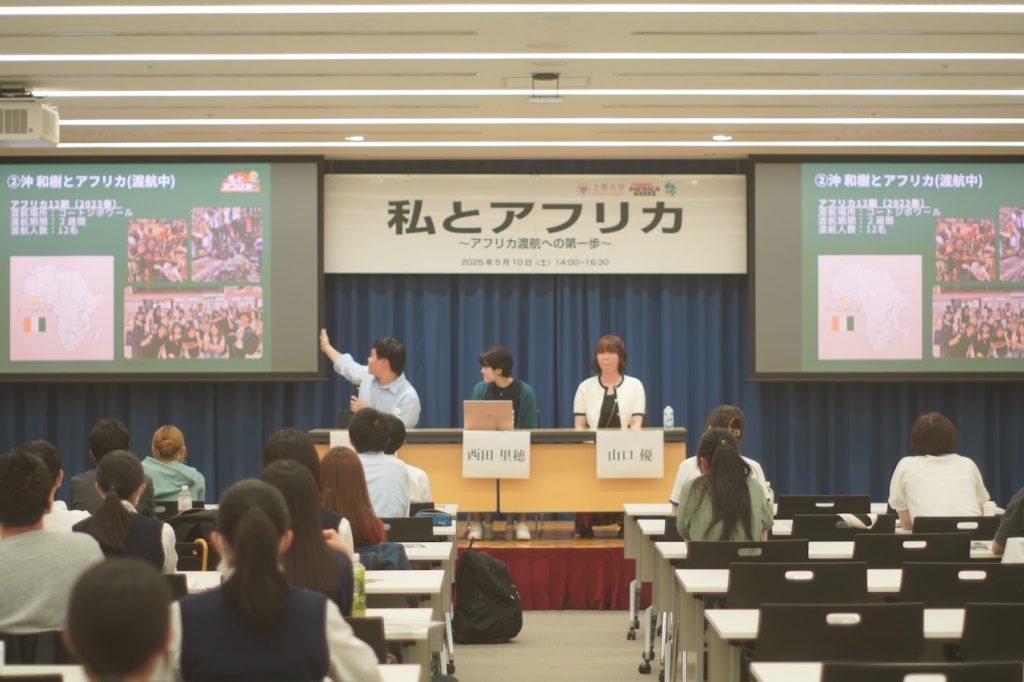
On May 10, we held a talk session entitled “Me and Africa” to provide an opportunity to connect with Africa through the experiences of our students and alumni who were exposed to the region during their studies at our university. Taisei Shibuya, a third-year student in the Department of Global Studies, served the moderator. Three students and alumni shared their experiences in Africa according to specific themes.
The first topic was “Why I become interested in Africa?” Nishida, who had been interested in volunteering for international cooperation since high school, found a two-week program called “Learning from Africa” (which was conducted online due to the pandemic) on the university bulletin board. “I felt like I wasn’t ready to try anything international, so I joined the program on the spur of the moment,” he recalls.
In keeping with the theme of “Experiences in Africa,” Oki, who traveled to Côte d’Ivoire for two weeks, shared experiences that he could not have had in his everyday life in Japan. “I helped at a local highway construction site and visited the Japanese embassy to speak with the staff. “I also helped with harvesting at a cacao farm and tasted the cacao, as well as tried various foods at a market,” he added.
The final theme was “Changes After Returning Home.” Yamaguchi, who traveled to Rwanda, Tanzania, and Namibia while in college and now works for a trading company, shared, “When I traveled to Africa, I wondered, ‘What can I personally do, given that my interests may change?’ However, I strongly wished to stay involved with Africa in some way. After graduating, I started working for a trading company in charge of the African region. I am involved in mining development projects and the trading of hygiene products, such as diapers. My experiences as a student influenced my career path,” he said.
Eiri Yamazaki (UEA) of the SFDP Promotion Office, who served as the coordinator, commented, “How one relates to Africa may depends on various factors. Regardless I think it is a land that will spark curiosity once someone is exposed to the region. The goal of this project is to create a space where individuals can nurture their fascination and bonds with the African continent.
Seminar: “Introduction to African Research at Sophia University”
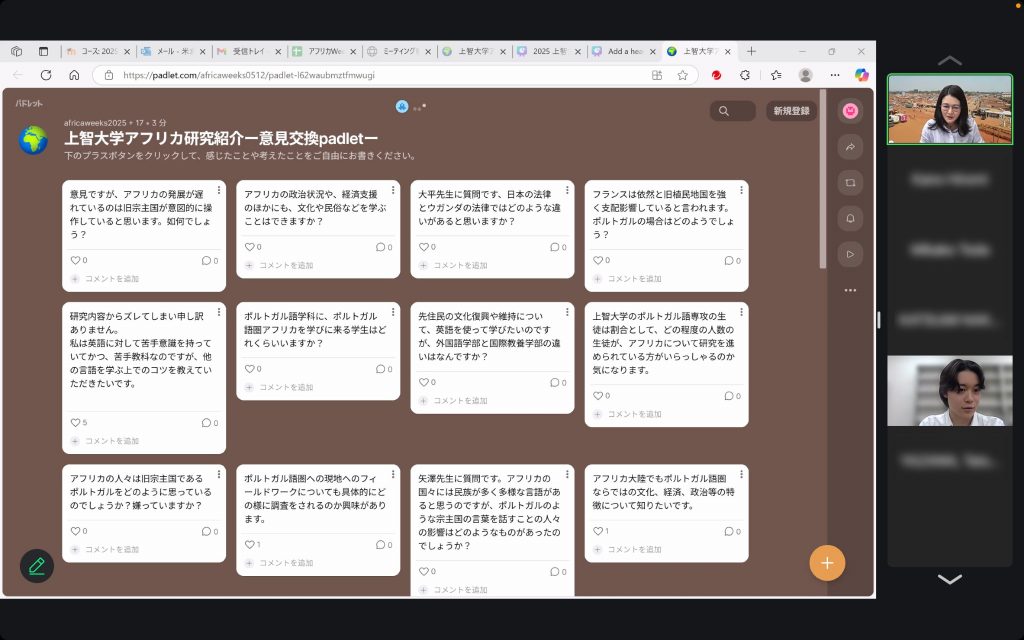
On May 12, Sophia University held a seminar to introduce its research, courses, practical programs, and student activities targeting the African region.
About 80 people attended the seminar, including high school and university students, as well as members of the general public and working adults. Naozumi Abe, a third-year student in the Department of Russian Studies at the Faculty of Foreign Studies and a member of the Africa Weeks Student Committee, served a moderator.
First, three members of the Africa Weeks Student Committee introduced their involvement with the African region, their activities, and the content of their research.
Mei Iida, a third-year student in the Department of Global Studies at the Faculty of Global Studies, talked about the activities of her student circle, the ASANTE PROJECT. The ASANTE PROJECT provides supplies (stationery, desks, etc.) and construction assistance in Tanzania while addressing local needs. She also explained that they sell products made from Kitenge, a type of African cloth, to fund their activities in Tanzania.
Sora Nakatake (3rd year, French Studies, Faculty of Foreign Studies) introduced her brand, “TWEBWE,” a line of African cloth and basket bags created in collaboration with Rwandan artisans. She said that she wants to support developing countries by enabling the creation of local employment and donating the proceeds from sales, rather than providing one-way support.
Katsumi Nakamura, a second-year Area Studies student at the Graduate School of Global Studies, discussed his fieldwork in the Republic of Togo. His research focuses on the development of phosphate ore and the problem that it is mined on a large scale for fertilizer, yet not used for agriculture and left unattended. He also discussed the political, social, and other issues behind this practice.
Next, three faculty members involved in African studies at Sophia University took the podium in turn.
Mikako Toda, Associate Professor in the Department of Global Studies at the Faculty of Global Studies, has conducted an Eco anthropological study of people with disabilities in Africa, focusing on Cameroon and Congo in Central Africa. She discussed the relationship between people with physical differences and the environment in tropical rainforest areas and reconsidered “care” in the context of African hunter-gatherer societies.
Wakiko Ohirawa (Assistant Professor, Center for Global Education and Discovery) discussed her research on contemporary politics and traditional authority in Uganda. After the British colonial rule, why do traditional authorities such as kingdoms and chiefdoms have so much influence in local governance after independence? She explained how she had conducted interviews with citizens and government officials in the region.
Tatsuhiro Yazawa (Professor, Department of Portugal, Faculty of Foreign Studies) discussed the politics and history of African countries that were once Portuguese territories, as well as the black movement in Brazil. He described the true value of his research, noting that it is significant to shed light on the Portuguese-speaking world, which has been overlooked in conventional research, to depict people of African descent struggling against colonial rule and racism, and to pursue dynamism that transcends a single region.
After the presentation, there was time for a Q&A session and for participants to introduce their views.
This seminar used a web service to facilitate interactive communication with participants. Despite the tendency for online seminars to be one-way, Q&A sessions were held in a format where real-time questions from participants were shared on the screen, facilitating a robust exchange of opinions.
Symposium: “Working in Africa Utilizing Language Skills.”
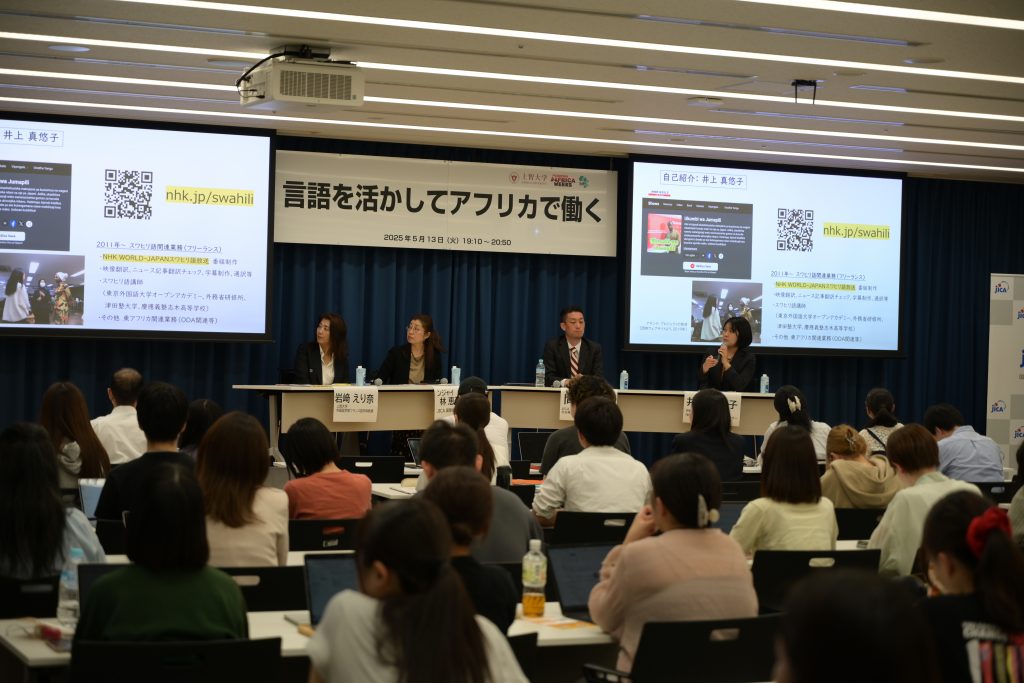
On May 13, a symposium was held primarily for high school and university students. The title of the event was “Working in Africa with the Language Skills.” Speakers who have worked in Africa discussed their experiences and the importance of acquiring language proficiency. Last year’s symposium centered on French, but this year’s event adopted a more comprehensive approach, encompassing a variety of languages. More than 100 people interested in Africa, as well as foreign languages and working in Africa, attended the event.
Erina Iwasaki, Professor at the Department of French Studies at the Faculty of Foreign Studies moderated the first half of the event, which featured guest speakers Emiko Njai Hayashi, Deputy Director General of the International Cooperation and Procurement Department at the Japan International Cooperation Agency (JICA); Masanari Mase, Senior Research Officer of the Transportation and Transport Group 2 Team at the JICA Social Infrastructure Department; and Mayuko Inoue, a Swahili language lecturer at the Ministry of Foreign Affairs Training Institute. Their speeches were followed by discussions.
Each of three speakers are fluent in French, Portuguese, and Swahili. They shared stories about their experiences learning these languages and how they relate to the culture and economy of each African country. They also recounted memorable episodes from their travels there.
“If you want to get to know someone, it’s important to be willing to learn their language, not just speak in a language that’s more convenient for you,” one of the speakers noted. I hope that each of you will continue to learn languages without losing interest. Participants sincerely appreciated such an advice.
In the second half of the session, there was a Q&A, during which participants engaged in a lively exchange of questions. The symposium ended on a high note with closing remarks by Shuhei Ueno, Deputy Director General of JICA’s Africa Department. There was also an opportunity for the speakers to interact with young JICA staff who have worked in French-speaking Africa.
Symposium: “Climate Change and World Heritage Sites in Africa”
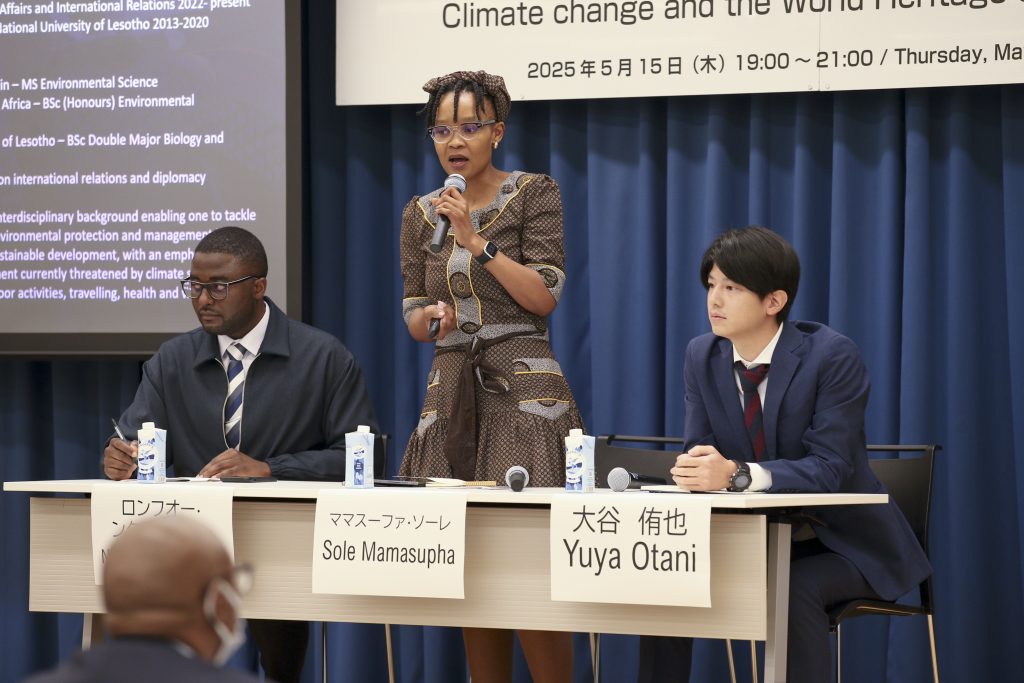
On March 15, a symposium was held to learn about the current state of African World Heritage Sites and discuss how we should approach nature and culture. The event featured keynote speeches by Nao Hayashi (BA, Department of History, Faculty of Humanities, 1997), World Heritage Convention Specialist; George Okello Abungu (Director Emeritus of the World Heritage Centre at UNESCO Headquarters, Kenya National Museum); and Nobue Amanuma (Fellow of the Institute for Global Environmental Strategies [IGES]). The symposium provided an opportunity to reflect on the current state of World Heritage and consider measures beyond the scope of national governments.
Hayashi discussed the World Heritage Center’s policy initiatives to preserve World Heritage sites for future generations. He also highlighted the World Heritage Center’s initiatives to enhance tourism infrastructure by introducing new functions to historical buildings, such as hotels and galleries, within the framework of public-private partnerships, citing specific examples.
Abungu, who has dedicated himself to preserving nature and culture throughout Africa, introduced African cultural heritage sites that have developed in harmony with nature. He presented photographs of these sites. “On the other hand, many world heritage sites and places of interest in Africa are in danger of vanishing due to climate change, such as global warming and rising sea levels. This is having a significant impact on local communities living in the surrounding areas,” he said, sounding the alarm about the current situation.
Amanuma, an environmental policy expert, presented data on the current state of climate change and its effects. Human activities are pushing the global environment to its limits. Accelerated cross-border economic activities are particularly severely affecting the poor and socially vulnerable.
The panel discussion that followed featured Mamasufa Sole, an environmental expert and Counselor at the Embassy of Lesotho in Japan, as well as Yuya Otani, , a full-time lecturer at the Faculty of International Studies at Setsunan University. The discussion was moderated by Longfor Nkweauseh Assistant Professor at the Graduate School of Global Environmental Studies, who took questions from participants to discuss sustainable actions that humankind must take.
Then Nkweauseh closed the symposium on a high note, hoping that the symposium would help people rediscover the beauty of Africa’s heritage and encourage each of us to change our mindsets in order to act.
Symposium: “Considering International Cooperation and Business in Africa”
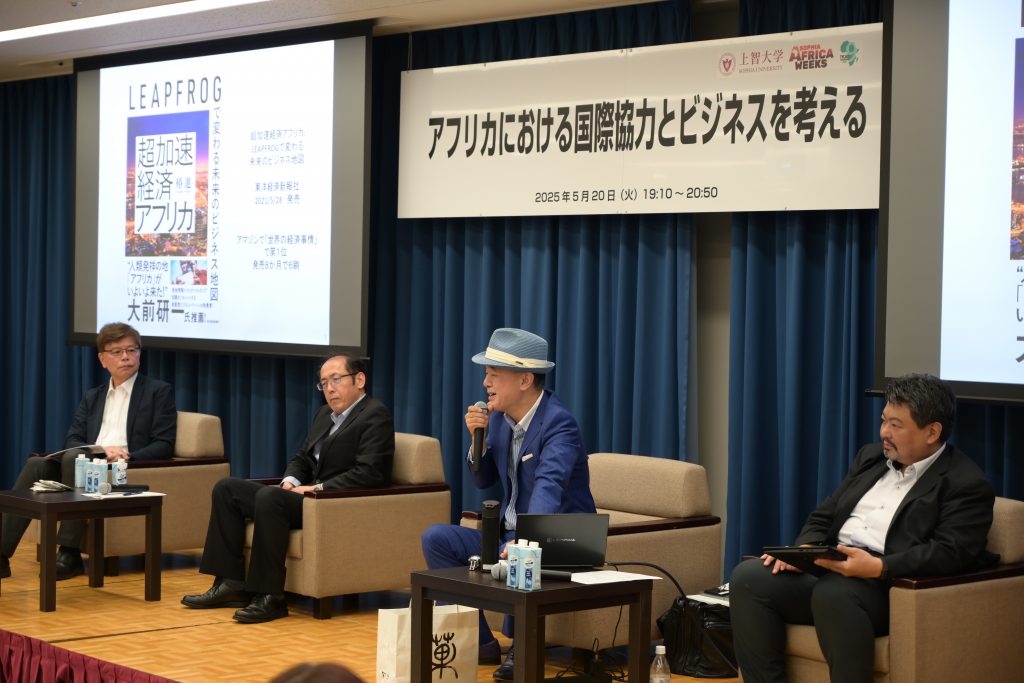
On January 20, a symposium was held to discuss the future of social issues and conducting business in Africa.
The keynote speech on the role of private companies in solving development issues in Africa was given by Tadashi Yokoyama, Director of the Tokyo Office of the International Finance Corporation (IFC).
He stated, “The private sector plays an important role in solving development issues. Japan’s industrial recovery after World War II is an example. Private investment and private companies were leading sustainable growth. There are great expectations that they can be an engine to accelerate technological innovation, economic growth, income growth, and other solutions to development issues.
He also mentioned that IFC is currently focusing on enhancement of employment and introduced IFC’s efforts as a public sector organization while addressing current state and challenges in Africa.
Tetsuo Kondo, Professor and Director of the Human Resource Center for International Cooperation of Sophia University, moderated the panel discussion.
The discussion featured Susumu Tsubaki, Founder and Managing Partner of Asia Africa Investment and Consulting, and Professor Atsuyuki Yamanaka of Kobe Institute of Information Science, an expert in ICT and development.
Tsubaki highlighted a diverse array of African businesses, spanning various sectors such as retail, food and beverage, and telecommunications. He emphasized that it would be a missed opportunity if these businesses remained under the radar, given the limited presence of Japanese companies in the African market. He also discussed the potential of African businesses, using the keywords “leapfrog” innovation and GX&SX. He encouraged the participants to “go out into the world and play an active role.”
Yamanaka shared insights on the potential of digital transformation in Africa, highlighting both the opportunities and challenges for businesses in the region. There’s still a big difference in how often people use digital tools,” he said. Conversely, he also voiced his aspiration that the digital market is a gold mine of opportunities because the barriers to investment are minimal and there are considerable demands.
In the Q&A session that took place in the second half of the event, participants demonstrated a keen interest in the current state of affairs in Africa. Various perspectives were explored, including “environmental concerns in developing countries,” “challenges related to information and communication technology and education,” and “the unintended consequences of multinational corporations’ entry into the region.“
Talk Session: “Ideas for our future: A Talk Session with African Youth in Japan
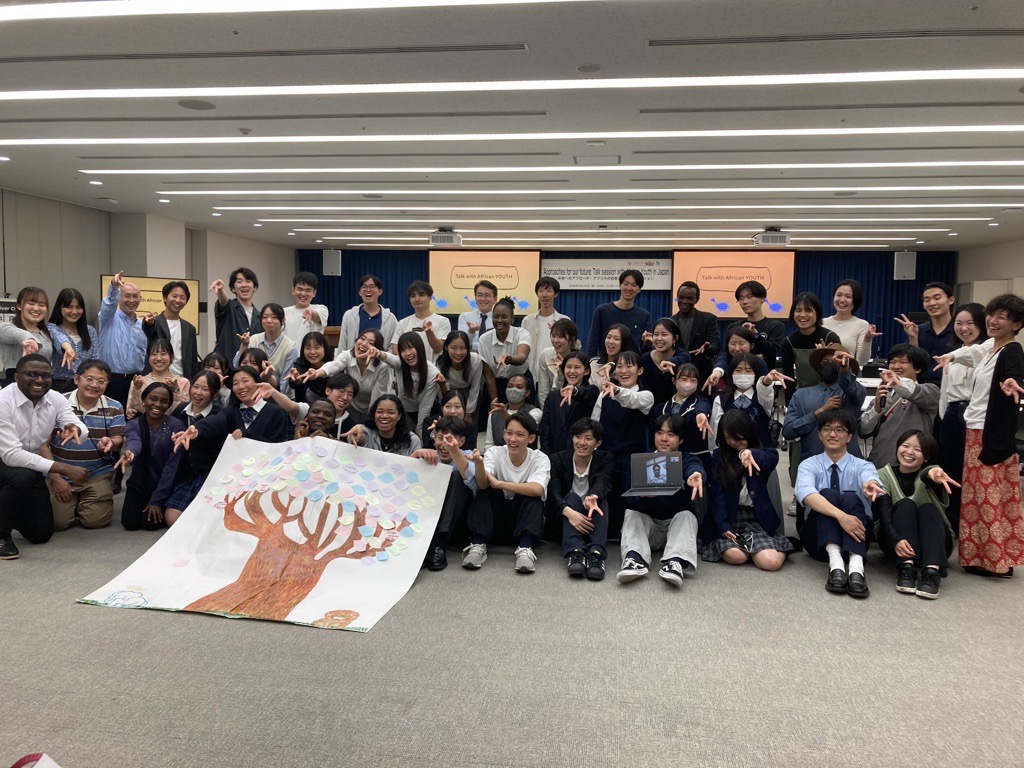
On the 23rd, the final day of the program, the Africa Weeks Student Committee organized a talk session titled “Ideas for Our Future.”
Taisei Shibuya, a third-year student at FGS, served as the moderator. He explained that the objective of this program is to foster mutual understanding and encourage dialogue between young people from Africa and Japan. This will serve as a foundation for future actions.
The opening performance was by Farai Malinga, a second-year student in the Graduate School of Global Environmental Studies from Zimbabwe. Malinga performed the poem Come on Africa.
The speakers at the event included Farai, as well as Kisindi from Kenya, Evelyn from Ghana, Masa from Malawi, and Longfor, Professor at the Graduate School of Global Environmental Studies who is from Cameroon. Each of these speakers introduced themselves and discussed the theme “Our Africa and Japan.”
The next activity was a lively dance session where everyone on the dance floor joined into the African beats. After everyone had had a chance to dance, the group was split into teams for a quiz about Africa.
During the latter half of the event, the participants were divided into eight tables for group discussions with the visitors. Each table was given a topic of interest from among the suggested themes. The participants then discussed it, wrote their findings on leaf-shaped notecards, and pasted them onto a picture of a baobab tree. The event ended with a group photo of all participants.
Shibuya, the head of the Student Committee, expressed his enthusiasm, stating, “I was thrilled and thoroughly enjoyed the event. A big round of applause to Dr. Yamazaki, who encouraged everyone to participate in planning the event from start to finish; to the public relations group, who managed the event and provided constant support; to those who prepared for the event; and to all who participated! “ He wrapped up Africa Weeks 2025, expressing his appreciation, that “I am truly lucky to have been a part of Africa Weeks 2025.”
Diversity of Africa Through Their Kitchen Tables
Please see the event report for the workshop, “Diversity of Africa Through Their Kitchen Tables.”
Student Magazine Project: With Africa:
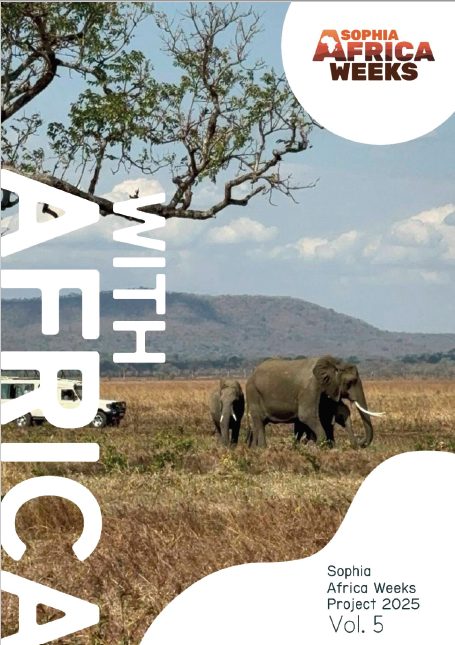
This 12-page magazine was planned, reported, and produced independently by students and is distributed at the Student Center, the Library, and the SFDP Promotion Office (1st floor, Building 1).
With AFRICA